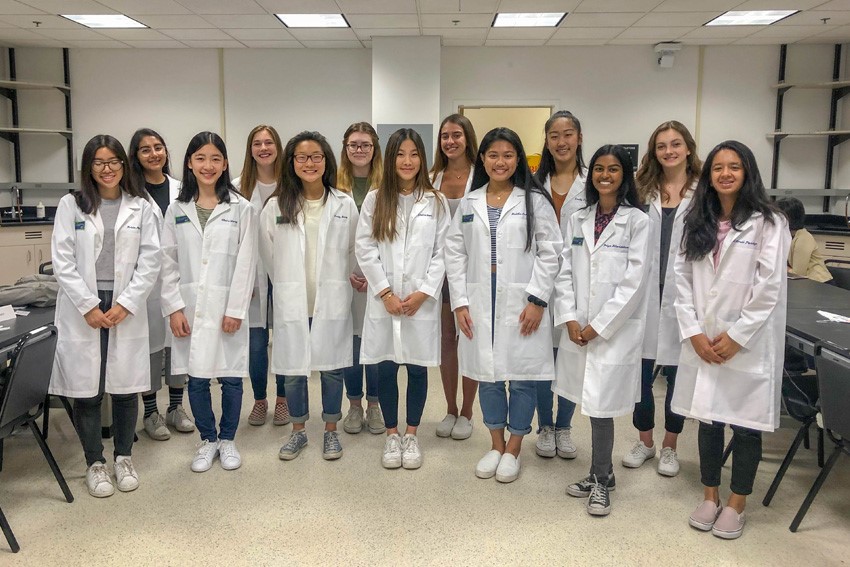6 February 2023
Reproductive and Oncofertility Science Academy Helps High School-Age San Diegans Explore STEM Careers

At first glance, the Reproductive and Oncofertility Science Academy, or ROSA, might seem daunting, especially for a high school student. The five-week summer program for juniors and seniors includes seminars with titles like, “Clinical Reproductive Physiology” and “Pathophysiology of PCOS.” For a final project, students must delve into a research topic inspired by what they’ve learned and present their findings to an audience of UC San Diego medical professionals.
But students who’ve been through the program describe it as a life-changing experience that’s helped shape their future careers.
UCLA pre-med student Anita Washburn, who participated in ROSA’s 2019 session as a rising senior at Eastlake High School, said the program forced her out of her comfort zone, “but in the best way possible.”
“I kind of went in feeling like, ‘Okay, maybe I can do this,’” she said. “I think it was just a big turning point for me, in terms of my ability to pursue a career in this field.”
ROSA launched in 2008 as the Oncofertility Saturday Academy with the help of a grant from the National Institutes of Health. Now a joint program of UC San Diego Health Sciences and the university’s Division of Extended Studies, ROSA’s mission is to nudge 11th and 12th graders toward careers in a STEM field (science, technology, engineering, math).
The program takes a deep dive into oncofertility, a relatively new, growing field that bridges the gap between oncology and reproductive endocrinology to address fertility preservation and related issues for young cancer patients. Since its inception, ROSA has expanded to an intensive five-week summer program, bringing in physicians and researchers to teach everything from the science of reproduction to the intricacies of robotic surgery — students get to try to string together a bracelet using a Da Vinci robot — to ethics in the field of reproductive medicine.
At the end of the first day’s session, students are given white lab coats during a traditional white coat ceremony and administered the Hippocratic Oath.
Washburn met her future UCLA roommate, Camila Esparza, through ROSA. Esparza attended Olympian High School in Chula Vista and, like Washburn, was a rising senior when she enrolled in ROSA. There were 14 students in their class, all women, from high schools throughout San Diego.
Esparza’s older sister had participated in the program and enjoyed it. She urged her younger sister to give it a try. Esparza, who’s currently studying psychobiology, said ROSA helped her realize her love of research. One of the program’s requirements is that students do a research “meta-analysis,” which involves reading 10 to 20 medical journal articles on reproductive health, choosing a research question based on their reading and formulating that information into a thesis and final presentation.
Esparza culled together research on pre-pubescent leukemia and the best approach to regrowing ovaries. Washburn’s project delved into a phenomenon known as unexplained infertility, where there’s nothing physiological to explain a woman’s inability to get pregnant.
“I kind of honed in on that because it was really interesting to me,” she said. “I can’t imagine walking out of a doctor’s office after hearing, ‘Sorry, we don’t know why you can’t have children.’”
On the last day of the program, students present their research project to an audience of families, their ROSA peers and members of UC San Diego’s medical staff.
Esparza said she had worried about struggling with the project — how can a high school student find gaps in medical research? — “but the program built up my confidence,” she said. “Getting questions from the professionals and seeing that they were interested in what you were researching and getting feedback from them was pretty incredible.”
Washburn, who currently works in a gynecology / oncology medical clinic, said the program changed her views on cancer, especially when it comes to the difficult decisions young people must make when they’re facing cancer treatments that could cause infertility.
“We heard a lot of stories of what it's like having cancer at a young age and the discussions you have to have and the parallels between this assumption that cancer is an epidemic for older people when that’s really not covering a very large population,” she said. “Having those perspectives from the program has been really valuable and it also made me more interested in these topics.”
The ROSA program is currently on hold for summer 2023, but organizers hope to bring it back later in 2023 and definitely in 2024. Details will be announced on the ROSA program website when they become available.
Esparza said she hopes the program continues and grows so that other students can get new perspectives on future careers.
“There are so many things I can look into and research. I think my perspective on that has really changed,” she said. “This program is an experience that you wouldn’t get anywhere else.”
Learn more about the ROSA program at UC San Diego Division of Extended Studies here.